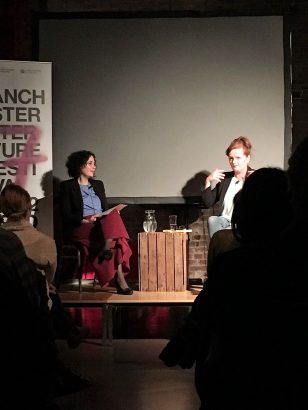 MLF Chapter & Verse
MLF Chapter & Verse
The Manchester Literature Festival Blog
Review: Dorthe Nors
Our reviewer Phil Olsen enjoys a captivating talk about writing, translation and stories that ‘take place in a breath’ with Danish author Dorthe Nors.
The opening Saturday of this year’s festival was a good day for fans of short stories. It was also a good day for fans of holing up in the International Anthony Burgess Foundation, as that’s where a triple bill of events took place, spread over seven hours and featuring Jon McGregor, Dorthe Nors and Sarah Hall. All three of these masters of short fiction are also novelists, but fans of short stories forgive them this.
As she got up to read an excerpt from her Man Booker International Prize shortlisted Mirror, Shoulder, Signal, Danish writer Dorthe Nors asked the audience to forgive her in advance for her pronunciation of certain words. The origins of interesting sounding accents came up when she sat down and joined Manchester Literature Festival’s Kate Feld in conversation, and once more when I shouted out a question in scouse. Dorthe told us that Danes from Aarhus often have it pointed out to them that they sound strangely Scottish, when in actual fact it is the Scots who sound Danish. “We came over and lopped off your heads, remember. We taught you.” said the Viking with a menacing chuckle.
It’s quite a boast to be the first ever Danish writer to have a short story published in the New Yorker (‘The Heron’ appeared in 2013). Such an achievement can – according to legend – often pay better than having a novel published, but for Dorthe the real prize was being exposed to America – a country that understands and appreciates the short form. There are only five million Danes in the world, she informs us, and “we’re not very literary in Denmark; we’re farmers.” Translation was necessary to reach a bigger readership and it’s more fun to have people enjoy your writing in different cultures. There’s a character in the darkly humorous ‘The Heron’ who is disdainfully referred to as the Heron Man due to his supposed ability to talk to the herons in Frederiksberg Gardens. The narrator wants him to pass on a message that they look stupid in flight. Everyone needs a good translator.
Asked how she arrived at short stories, she explained that her novels got slimmer and slimmer each time and it “felt like I’d been trying to learn cello and then discovering that I was actually quite good at the ukulele.” She admires the challenge of a short story, having to be on beat all the time with no room to make mistakes. She sees a strong connection between music, poetry and the short form – all requiring succinctness and rhythm. Fragments sit on her desk for years and then she gets an epiphany and knows how to turn it into a story.
“My stories aren’t like Alice Munro short stories…” (i.e. actually pretty long), “they sort of take place in a breath. Then I took this very precise way of writing and took it into my subsequent novel. How little can you say and still be saying a lot? Furniture and architecture is seen as simple and precise in Denmark; it is what it is. I wanted to apply that to my fiction.”
Translation came up again when a member of the audience said he noticed an American voice coming through in some of her work. She talked about the close relationship with the translator and all the back-and-forth involved; receiving a translated chapter back while she’s still working on the next chapter in Danish. The English language version was to go to print first. “Danish is a playful language where you have to be very precise. One thing can mean six things depending on where you put it in the sentence. There’s a reason we invented Lego and that’s because there are so many ways that we can put things together.”
On advice for aspiring writers, Dorthe’s rule number one is to have fun with your writing – sage words from the woman who wrote a novella, Minna Needs Rehearsal Space, entirely in Facebook status updates. “I like when you laugh at the beginning of a sentence and cry at the end of it. I laugh at my own stuff as I’m writing it and people think I’m crazy but it’s because something is happening on the screen that I’m new to. Just as you are, when you’re reading it.”
No social media status updates will be filling the world in on what’s coming next though. Asked what she is writing now, Dorthe replied, “Books you talk about never happen so I don’t say what the writing is about!”
In ‘The Heron’ we learn that “The golden retriever has a secret urge to roll around in carcasses”. In that vein, I’m off to roll around in some more Dorthe Nors’ stories.
Phil Olsen won the Northern Short Story Festival 2017 Flash Fiction Slam, Writing on the Wall’s WoWFest 2016 flash fiction competition and Book Week Scotland’s 2014 flash fiction competition. Find him on Twitter @Liverpolsen
Image: Hazel Nico Shaw via Twitter
